Corporate Law Report: Ardent Leisure and Corporate Governance Issues
VerifiedAdded on 2019/11/19
|10
|2356
|148
Report
AI Summary
This corporate law report examines corporate governance principles, particularly focusing on the application of ASX recommendations regarding risk management frameworks. The report analyzes the Ardent Leisure case, specifically the Dreamworld incident, to illustrate failures in identifying and mitigating risks. It delves into the legal responsibilities of directors under the Corporations Act 2001 (Cth), emphasizing the importance of due care and diligence. The report highlights the consequences of non-compliance, including financial losses, reputational damage, and potential penalties. Furthermore, the report explores the impact of the incident on the company's leadership and its subsequent efforts to address the situation, including the implementation of new risk management strategies and the closure of the Thunder River Rapids ride. The analysis underscores the critical role of effective corporate governance in preventing similar incidents and maintaining the company's standing in the global entertainment market.
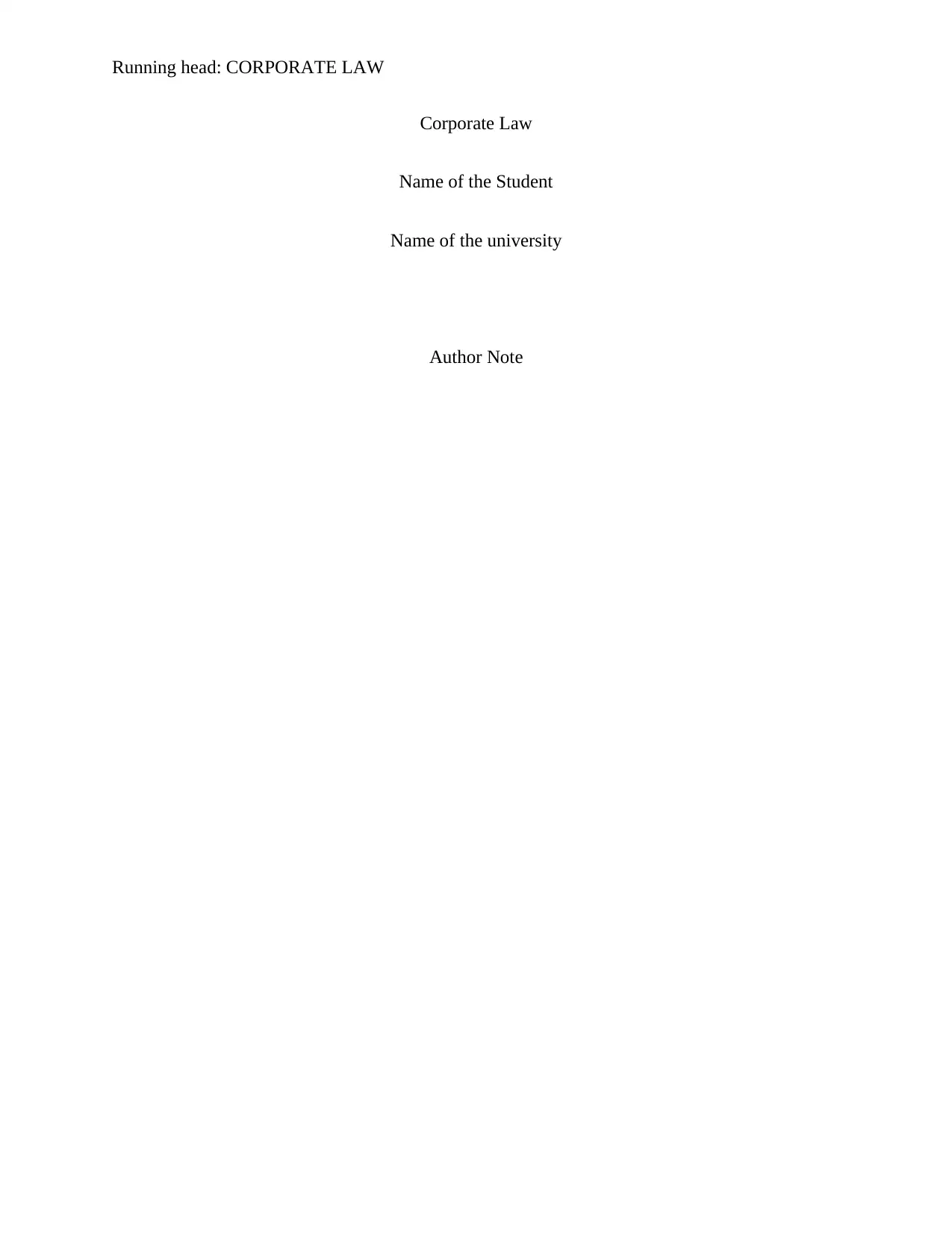
Running head: CORPORATE LAW
Corporate Law
Name of the Student
Name of the university
Author Note
Corporate Law
Name of the Student
Name of the university
Author Note
Paraphrase This Document
Need a fresh take? Get an instant paraphrase of this document with our AI Paraphraser
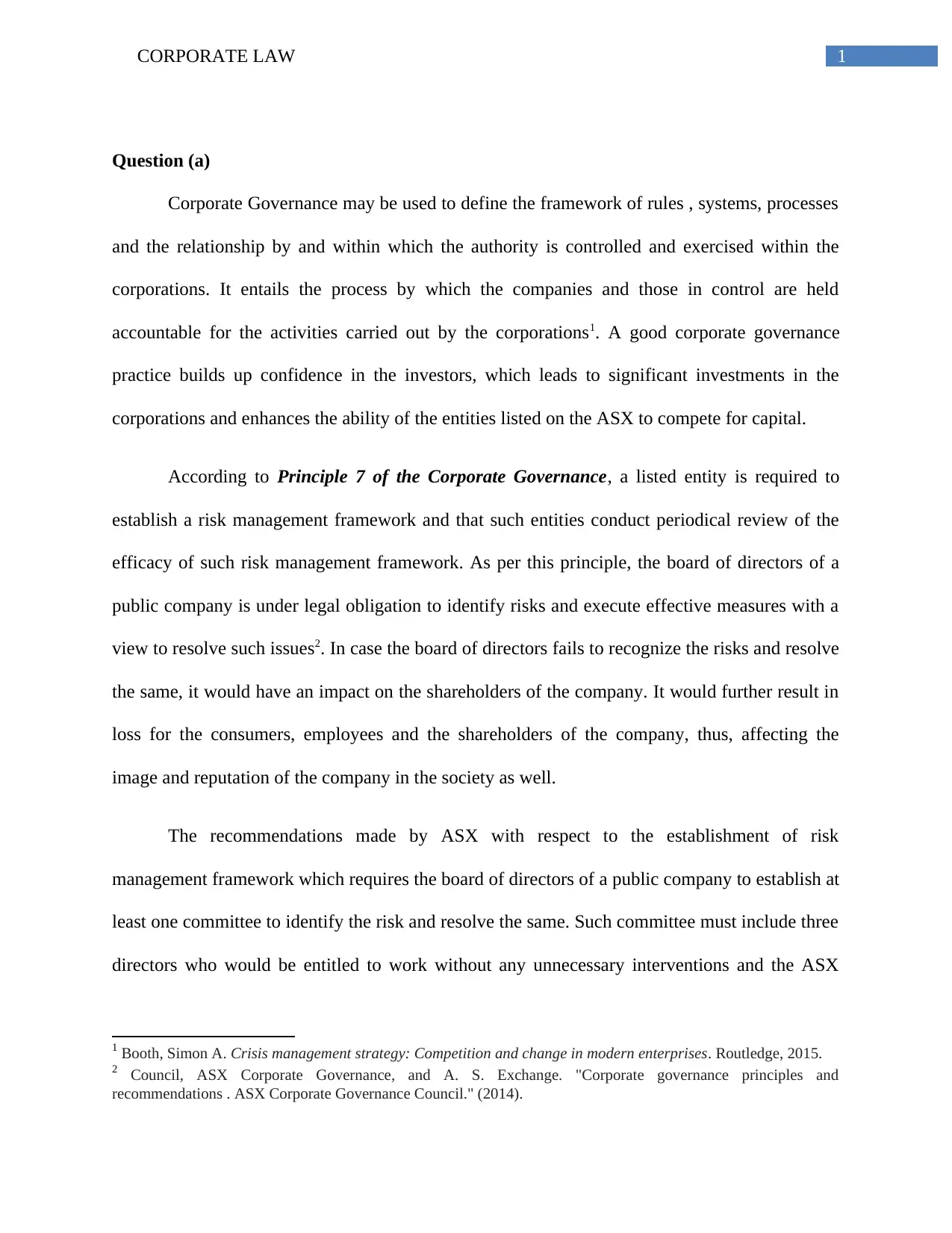
1CORPORATE LAW
Question (a)
Corporate Governance may be used to define the framework of rules , systems, processes
and the relationship by and within which the authority is controlled and exercised within the
corporations. It entails the process by which the companies and those in control are held
accountable for the activities carried out by the corporations1. A good corporate governance
practice builds up confidence in the investors, which leads to significant investments in the
corporations and enhances the ability of the entities listed on the ASX to compete for capital.
According to Principle 7 of the Corporate Governance, a listed entity is required to
establish a risk management framework and that such entities conduct periodical review of the
efficacy of such risk management framework. As per this principle, the board of directors of a
public company is under legal obligation to identify risks and execute effective measures with a
view to resolve such issues2. In case the board of directors fails to recognize the risks and resolve
the same, it would have an impact on the shareholders of the company. It would further result in
loss for the consumers, employees and the shareholders of the company, thus, affecting the
image and reputation of the company in the society as well.
The recommendations made by ASX with respect to the establishment of risk
management framework which requires the board of directors of a public company to establish at
least one committee to identify the risk and resolve the same. Such committee must include three
directors who would be entitled to work without any unnecessary interventions and the ASX
1 Booth, Simon A. Crisis management strategy: Competition and change in modern enterprises. Routledge, 2015.
2 Council, ASX Corporate Governance, and A. S. Exchange. "Corporate governance principles and
recommendations . ASX Corporate Governance Council." (2014).
Question (a)
Corporate Governance may be used to define the framework of rules , systems, processes
and the relationship by and within which the authority is controlled and exercised within the
corporations. It entails the process by which the companies and those in control are held
accountable for the activities carried out by the corporations1. A good corporate governance
practice builds up confidence in the investors, which leads to significant investments in the
corporations and enhances the ability of the entities listed on the ASX to compete for capital.
According to Principle 7 of the Corporate Governance, a listed entity is required to
establish a risk management framework and that such entities conduct periodical review of the
efficacy of such risk management framework. As per this principle, the board of directors of a
public company is under legal obligation to identify risks and execute effective measures with a
view to resolve such issues2. In case the board of directors fails to recognize the risks and resolve
the same, it would have an impact on the shareholders of the company. It would further result in
loss for the consumers, employees and the shareholders of the company, thus, affecting the
image and reputation of the company in the society as well.
The recommendations made by ASX with respect to the establishment of risk
management framework which requires the board of directors of a public company to establish at
least one committee to identify the risk and resolve the same. Such committee must include three
directors who would be entitled to work without any unnecessary interventions and the ASX
1 Booth, Simon A. Crisis management strategy: Competition and change in modern enterprises. Routledge, 2015.
2 Council, ASX Corporate Governance, and A. S. Exchange. "Corporate governance principles and
recommendations . ASX Corporate Governance Council." (2014).
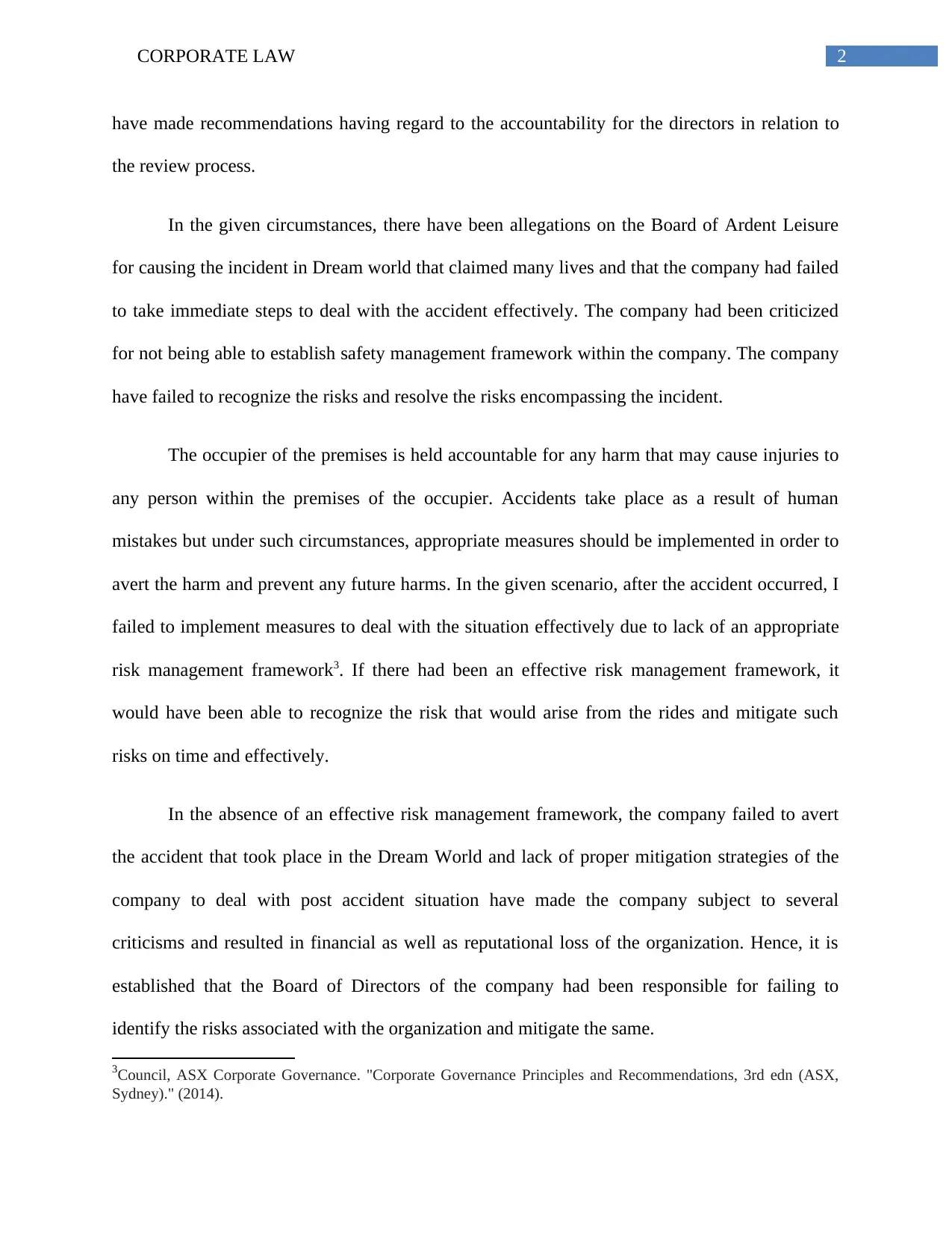
2CORPORATE LAW
have made recommendations having regard to the accountability for the directors in relation to
the review process.
In the given circumstances, there have been allegations on the Board of Ardent Leisure
for causing the incident in Dream world that claimed many lives and that the company had failed
to take immediate steps to deal with the accident effectively. The company had been criticized
for not being able to establish safety management framework within the company. The company
have failed to recognize the risks and resolve the risks encompassing the incident.
The occupier of the premises is held accountable for any harm that may cause injuries to
any person within the premises of the occupier. Accidents take place as a result of human
mistakes but under such circumstances, appropriate measures should be implemented in order to
avert the harm and prevent any future harms. In the given scenario, after the accident occurred, I
failed to implement measures to deal with the situation effectively due to lack of an appropriate
risk management framework3. If there had been an effective risk management framework, it
would have been able to recognize the risk that would arise from the rides and mitigate such
risks on time and effectively.
In the absence of an effective risk management framework, the company failed to avert
the accident that took place in the Dream World and lack of proper mitigation strategies of the
company to deal with post accident situation have made the company subject to several
criticisms and resulted in financial as well as reputational loss of the organization. Hence, it is
established that the Board of Directors of the company had been responsible for failing to
identify the risks associated with the organization and mitigate the same.
3Council, ASX Corporate Governance. "Corporate Governance Principles and Recommendations, 3rd edn (ASX,
Sydney)." (2014).
have made recommendations having regard to the accountability for the directors in relation to
the review process.
In the given circumstances, there have been allegations on the Board of Ardent Leisure
for causing the incident in Dream world that claimed many lives and that the company had failed
to take immediate steps to deal with the accident effectively. The company had been criticized
for not being able to establish safety management framework within the company. The company
have failed to recognize the risks and resolve the risks encompassing the incident.
The occupier of the premises is held accountable for any harm that may cause injuries to
any person within the premises of the occupier. Accidents take place as a result of human
mistakes but under such circumstances, appropriate measures should be implemented in order to
avert the harm and prevent any future harms. In the given scenario, after the accident occurred, I
failed to implement measures to deal with the situation effectively due to lack of an appropriate
risk management framework3. If there had been an effective risk management framework, it
would have been able to recognize the risk that would arise from the rides and mitigate such
risks on time and effectively.
In the absence of an effective risk management framework, the company failed to avert
the accident that took place in the Dream World and lack of proper mitigation strategies of the
company to deal with post accident situation have made the company subject to several
criticisms and resulted in financial as well as reputational loss of the organization. Hence, it is
established that the Board of Directors of the company had been responsible for failing to
identify the risks associated with the organization and mitigate the same.
3Council, ASX Corporate Governance. "Corporate Governance Principles and Recommendations, 3rd edn (ASX,
Sydney)." (2014).
⊘ This is a preview!⊘
Do you want full access?
Subscribe today to unlock all pages.

Trusted by 1+ million students worldwide
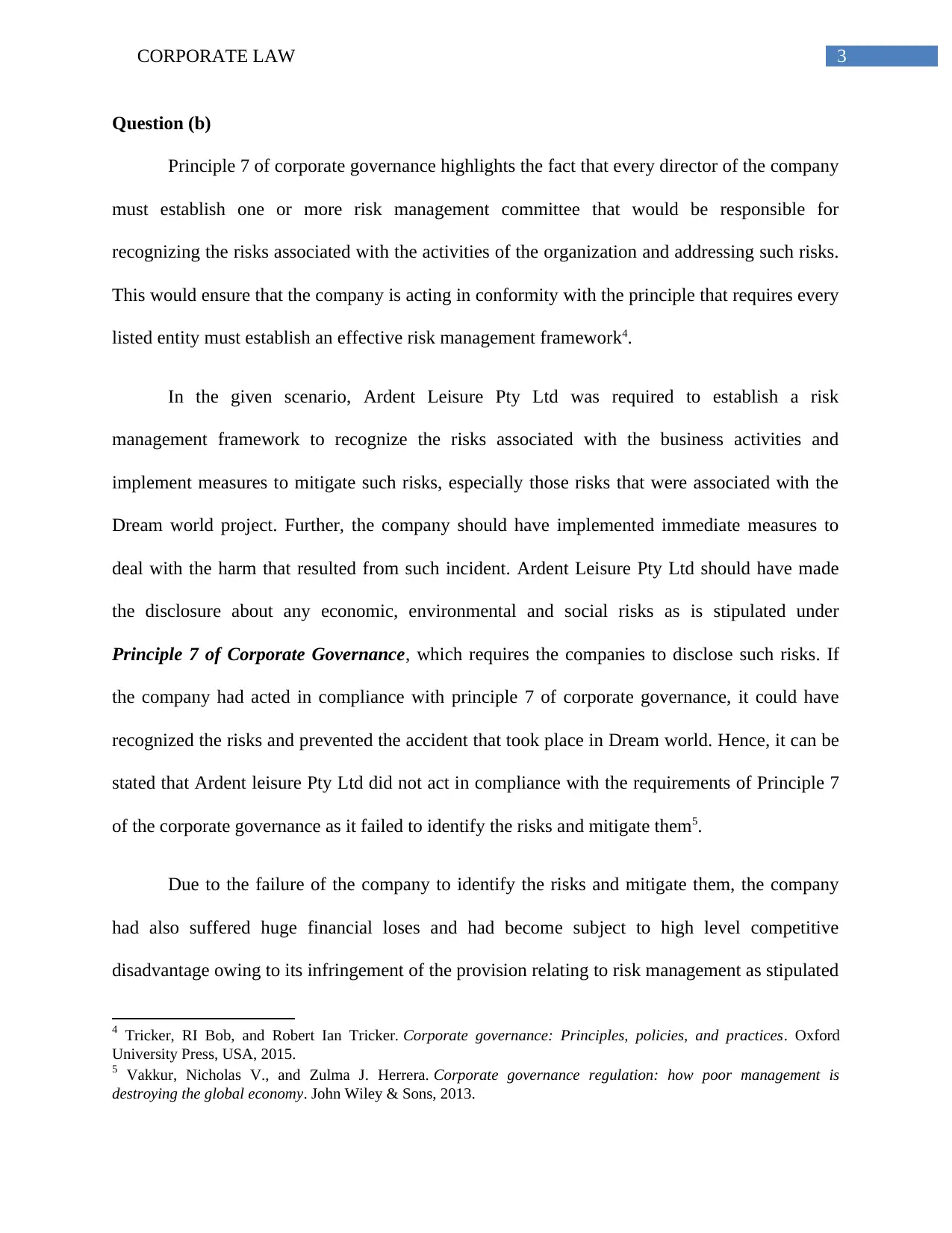
3CORPORATE LAW
Question (b)
Principle 7 of corporate governance highlights the fact that every director of the company
must establish one or more risk management committee that would be responsible for
recognizing the risks associated with the activities of the organization and addressing such risks.
This would ensure that the company is acting in conformity with the principle that requires every
listed entity must establish an effective risk management framework4.
In the given scenario, Ardent Leisure Pty Ltd was required to establish a risk
management framework to recognize the risks associated with the business activities and
implement measures to mitigate such risks, especially those risks that were associated with the
Dream world project. Further, the company should have implemented immediate measures to
deal with the harm that resulted from such incident. Ardent Leisure Pty Ltd should have made
the disclosure about any economic, environmental and social risks as is stipulated under
Principle 7 of Corporate Governance, which requires the companies to disclose such risks. If
the company had acted in compliance with principle 7 of corporate governance, it could have
recognized the risks and prevented the accident that took place in Dream world. Hence, it can be
stated that Ardent leisure Pty Ltd did not act in compliance with the requirements of Principle 7
of the corporate governance as it failed to identify the risks and mitigate them5.
Due to the failure of the company to identify the risks and mitigate them, the company
had also suffered huge financial loses and had become subject to high level competitive
disadvantage owing to its infringement of the provision relating to risk management as stipulated
4 Tricker, RI Bob, and Robert Ian Tricker. Corporate governance: Principles, policies, and practices. Oxford
University Press, USA, 2015.
5 Vakkur, Nicholas V., and Zulma J. Herrera. Corporate governance regulation: how poor management is
destroying the global economy. John Wiley & Sons, 2013.
Question (b)
Principle 7 of corporate governance highlights the fact that every director of the company
must establish one or more risk management committee that would be responsible for
recognizing the risks associated with the activities of the organization and addressing such risks.
This would ensure that the company is acting in conformity with the principle that requires every
listed entity must establish an effective risk management framework4.
In the given scenario, Ardent Leisure Pty Ltd was required to establish a risk
management framework to recognize the risks associated with the business activities and
implement measures to mitigate such risks, especially those risks that were associated with the
Dream world project. Further, the company should have implemented immediate measures to
deal with the harm that resulted from such incident. Ardent Leisure Pty Ltd should have made
the disclosure about any economic, environmental and social risks as is stipulated under
Principle 7 of Corporate Governance, which requires the companies to disclose such risks. If
the company had acted in compliance with principle 7 of corporate governance, it could have
recognized the risks and prevented the accident that took place in Dream world. Hence, it can be
stated that Ardent leisure Pty Ltd did not act in compliance with the requirements of Principle 7
of the corporate governance as it failed to identify the risks and mitigate them5.
Due to the failure of the company to identify the risks and mitigate them, the company
had also suffered huge financial loses and had become subject to high level competitive
disadvantage owing to its infringement of the provision relating to risk management as stipulated
4 Tricker, RI Bob, and Robert Ian Tricker. Corporate governance: Principles, policies, and practices. Oxford
University Press, USA, 2015.
5 Vakkur, Nicholas V., and Zulma J. Herrera. Corporate governance regulation: how poor management is
destroying the global economy. John Wiley & Sons, 2013.
Paraphrase This Document
Need a fresh take? Get an instant paraphrase of this document with our AI Paraphraser
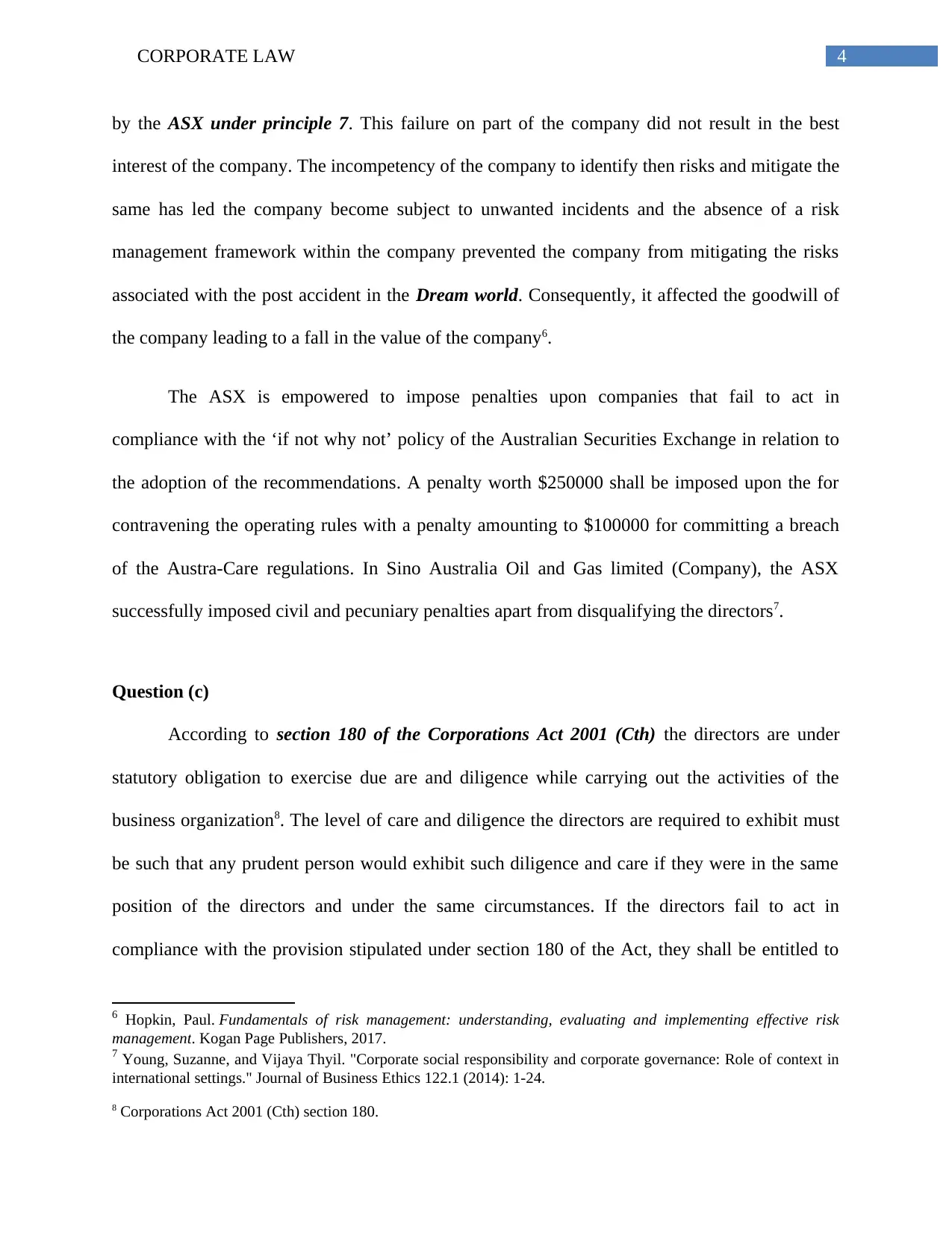
4CORPORATE LAW
by the ASX under principle 7. This failure on part of the company did not result in the best
interest of the company. The incompetency of the company to identify then risks and mitigate the
same has led the company become subject to unwanted incidents and the absence of a risk
management framework within the company prevented the company from mitigating the risks
associated with the post accident in the Dream world. Consequently, it affected the goodwill of
the company leading to a fall in the value of the company6.
The ASX is empowered to impose penalties upon companies that fail to act in
compliance with the ‘if not why not’ policy of the Australian Securities Exchange in relation to
the adoption of the recommendations. A penalty worth $250000 shall be imposed upon the for
contravening the operating rules with a penalty amounting to $100000 for committing a breach
of the Austra-Care regulations. In Sino Australia Oil and Gas limited (Company), the ASX
successfully imposed civil and pecuniary penalties apart from disqualifying the directors7.
Question (c)
According to section 180 of the Corporations Act 2001 (Cth) the directors are under
statutory obligation to exercise due are and diligence while carrying out the activities of the
business organization8. The level of care and diligence the directors are required to exhibit must
be such that any prudent person would exhibit such diligence and care if they were in the same
position of the directors and under the same circumstances. If the directors fail to act in
compliance with the provision stipulated under section 180 of the Act, they shall be entitled to
6 Hopkin, Paul. Fundamentals of risk management: understanding, evaluating and implementing effective risk
management. Kogan Page Publishers, 2017.
7 Young, Suzanne, and Vijaya Thyil. "Corporate social responsibility and corporate governance: Role of context in
international settings." Journal of Business Ethics 122.1 (2014): 1-24.
8 Corporations Act 2001 (Cth) section 180.
by the ASX under principle 7. This failure on part of the company did not result in the best
interest of the company. The incompetency of the company to identify then risks and mitigate the
same has led the company become subject to unwanted incidents and the absence of a risk
management framework within the company prevented the company from mitigating the risks
associated with the post accident in the Dream world. Consequently, it affected the goodwill of
the company leading to a fall in the value of the company6.
The ASX is empowered to impose penalties upon companies that fail to act in
compliance with the ‘if not why not’ policy of the Australian Securities Exchange in relation to
the adoption of the recommendations. A penalty worth $250000 shall be imposed upon the for
contravening the operating rules with a penalty amounting to $100000 for committing a breach
of the Austra-Care regulations. In Sino Australia Oil and Gas limited (Company), the ASX
successfully imposed civil and pecuniary penalties apart from disqualifying the directors7.
Question (c)
According to section 180 of the Corporations Act 2001 (Cth) the directors are under
statutory obligation to exercise due are and diligence while carrying out the activities of the
business organization8. The level of care and diligence the directors are required to exhibit must
be such that any prudent person would exhibit such diligence and care if they were in the same
position of the directors and under the same circumstances. If the directors fail to act in
compliance with the provision stipulated under section 180 of the Act, they shall be entitled to
6 Hopkin, Paul. Fundamentals of risk management: understanding, evaluating and implementing effective risk
management. Kogan Page Publishers, 2017.
7 Young, Suzanne, and Vijaya Thyil. "Corporate social responsibility and corporate governance: Role of context in
international settings." Journal of Business Ethics 122.1 (2014): 1-24.
8 Corporations Act 2001 (Cth) section 180.
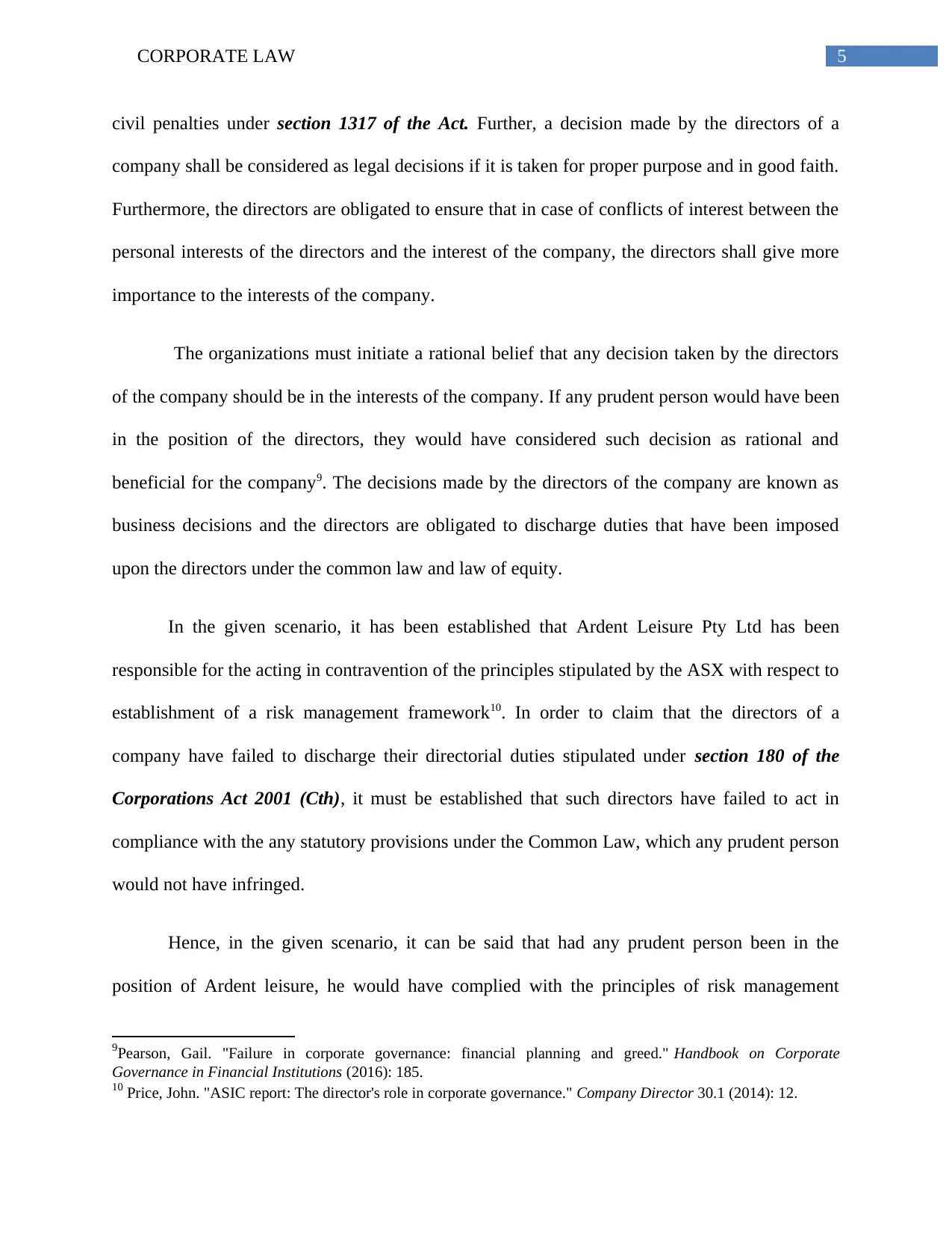
5CORPORATE LAW
civil penalties under section 1317 of the Act. Further, a decision made by the directors of a
company shall be considered as legal decisions if it is taken for proper purpose and in good faith.
Furthermore, the directors are obligated to ensure that in case of conflicts of interest between the
personal interests of the directors and the interest of the company, the directors shall give more
importance to the interests of the company.
The organizations must initiate a rational belief that any decision taken by the directors
of the company should be in the interests of the company. If any prudent person would have been
in the position of the directors, they would have considered such decision as rational and
beneficial for the company9. The decisions made by the directors of the company are known as
business decisions and the directors are obligated to discharge duties that have been imposed
upon the directors under the common law and law of equity.
In the given scenario, it has been established that Ardent Leisure Pty Ltd has been
responsible for the acting in contravention of the principles stipulated by the ASX with respect to
establishment of a risk management framework10. In order to claim that the directors of a
company have failed to discharge their directorial duties stipulated under section 180 of the
Corporations Act 2001 (Cth), it must be established that such directors have failed to act in
compliance with the any statutory provisions under the Common Law, which any prudent person
would not have infringed.
Hence, in the given scenario, it can be said that had any prudent person been in the
position of Ardent leisure, he would have complied with the principles of risk management
9Pearson, Gail. "Failure in corporate governance: financial planning and greed." Handbook on Corporate
Governance in Financial Institutions (2016): 185.
10 Price, John. "ASIC report: The director's role in corporate governance." Company Director 30.1 (2014): 12.
civil penalties under section 1317 of the Act. Further, a decision made by the directors of a
company shall be considered as legal decisions if it is taken for proper purpose and in good faith.
Furthermore, the directors are obligated to ensure that in case of conflicts of interest between the
personal interests of the directors and the interest of the company, the directors shall give more
importance to the interests of the company.
The organizations must initiate a rational belief that any decision taken by the directors
of the company should be in the interests of the company. If any prudent person would have been
in the position of the directors, they would have considered such decision as rational and
beneficial for the company9. The decisions made by the directors of the company are known as
business decisions and the directors are obligated to discharge duties that have been imposed
upon the directors under the common law and law of equity.
In the given scenario, it has been established that Ardent Leisure Pty Ltd has been
responsible for the acting in contravention of the principles stipulated by the ASX with respect to
establishment of a risk management framework10. In order to claim that the directors of a
company have failed to discharge their directorial duties stipulated under section 180 of the
Corporations Act 2001 (Cth), it must be established that such directors have failed to act in
compliance with the any statutory provisions under the Common Law, which any prudent person
would not have infringed.
Hence, in the given scenario, it can be said that had any prudent person been in the
position of Ardent leisure, he would have complied with the principles of risk management
9Pearson, Gail. "Failure in corporate governance: financial planning and greed." Handbook on Corporate
Governance in Financial Institutions (2016): 185.
10 Price, John. "ASIC report: The director's role in corporate governance." Company Director 30.1 (2014): 12.
⊘ This is a preview!⊘
Do you want full access?
Subscribe today to unlock all pages.

Trusted by 1+ million students worldwide
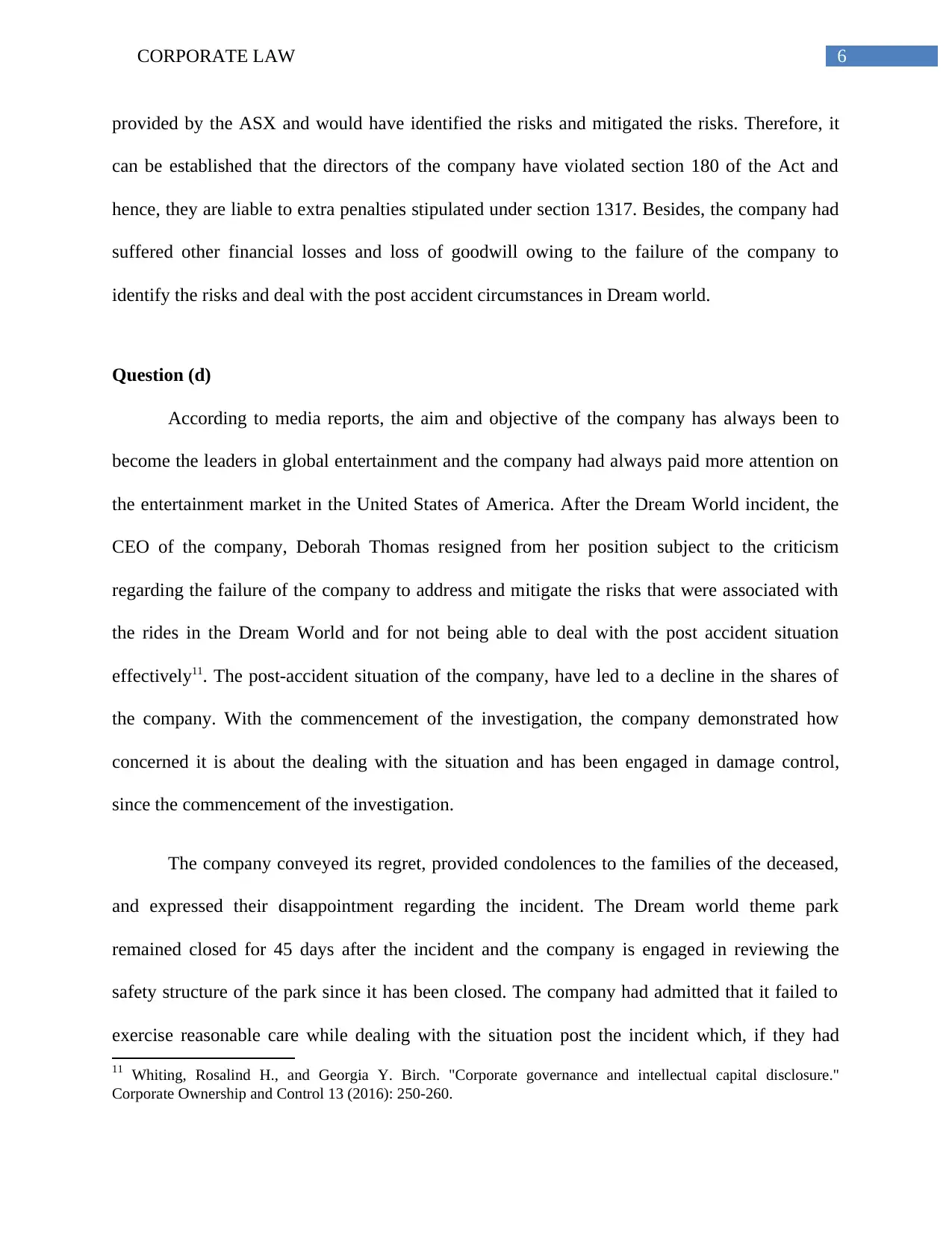
6CORPORATE LAW
provided by the ASX and would have identified the risks and mitigated the risks. Therefore, it
can be established that the directors of the company have violated section 180 of the Act and
hence, they are liable to extra penalties stipulated under section 1317. Besides, the company had
suffered other financial losses and loss of goodwill owing to the failure of the company to
identify the risks and deal with the post accident circumstances in Dream world.
Question (d)
According to media reports, the aim and objective of the company has always been to
become the leaders in global entertainment and the company had always paid more attention on
the entertainment market in the United States of America. After the Dream World incident, the
CEO of the company, Deborah Thomas resigned from her position subject to the criticism
regarding the failure of the company to address and mitigate the risks that were associated with
the rides in the Dream World and for not being able to deal with the post accident situation
effectively11. The post-accident situation of the company, have led to a decline in the shares of
the company. With the commencement of the investigation, the company demonstrated how
concerned it is about the dealing with the situation and has been engaged in damage control,
since the commencement of the investigation.
The company conveyed its regret, provided condolences to the families of the deceased,
and expressed their disappointment regarding the incident. The Dream world theme park
remained closed for 45 days after the incident and the company is engaged in reviewing the
safety structure of the park since it has been closed. The company had admitted that it failed to
exercise reasonable care while dealing with the situation post the incident which, if they had
11 Whiting, Rosalind H., and Georgia Y. Birch. "Corporate governance and intellectual capital disclosure."
Corporate Ownership and Control 13 (2016): 250-260.
provided by the ASX and would have identified the risks and mitigated the risks. Therefore, it
can be established that the directors of the company have violated section 180 of the Act and
hence, they are liable to extra penalties stipulated under section 1317. Besides, the company had
suffered other financial losses and loss of goodwill owing to the failure of the company to
identify the risks and deal with the post accident circumstances in Dream world.
Question (d)
According to media reports, the aim and objective of the company has always been to
become the leaders in global entertainment and the company had always paid more attention on
the entertainment market in the United States of America. After the Dream World incident, the
CEO of the company, Deborah Thomas resigned from her position subject to the criticism
regarding the failure of the company to address and mitigate the risks that were associated with
the rides in the Dream World and for not being able to deal with the post accident situation
effectively11. The post-accident situation of the company, have led to a decline in the shares of
the company. With the commencement of the investigation, the company demonstrated how
concerned it is about the dealing with the situation and has been engaged in damage control,
since the commencement of the investigation.
The company conveyed its regret, provided condolences to the families of the deceased,
and expressed their disappointment regarding the incident. The Dream world theme park
remained closed for 45 days after the incident and the company is engaged in reviewing the
safety structure of the park since it has been closed. The company had admitted that it failed to
exercise reasonable care while dealing with the situation post the incident which, if they had
11 Whiting, Rosalind H., and Georgia Y. Birch. "Corporate governance and intellectual capital disclosure."
Corporate Ownership and Control 13 (2016): 250-260.
Paraphrase This Document
Need a fresh take? Get an instant paraphrase of this document with our AI Paraphraser
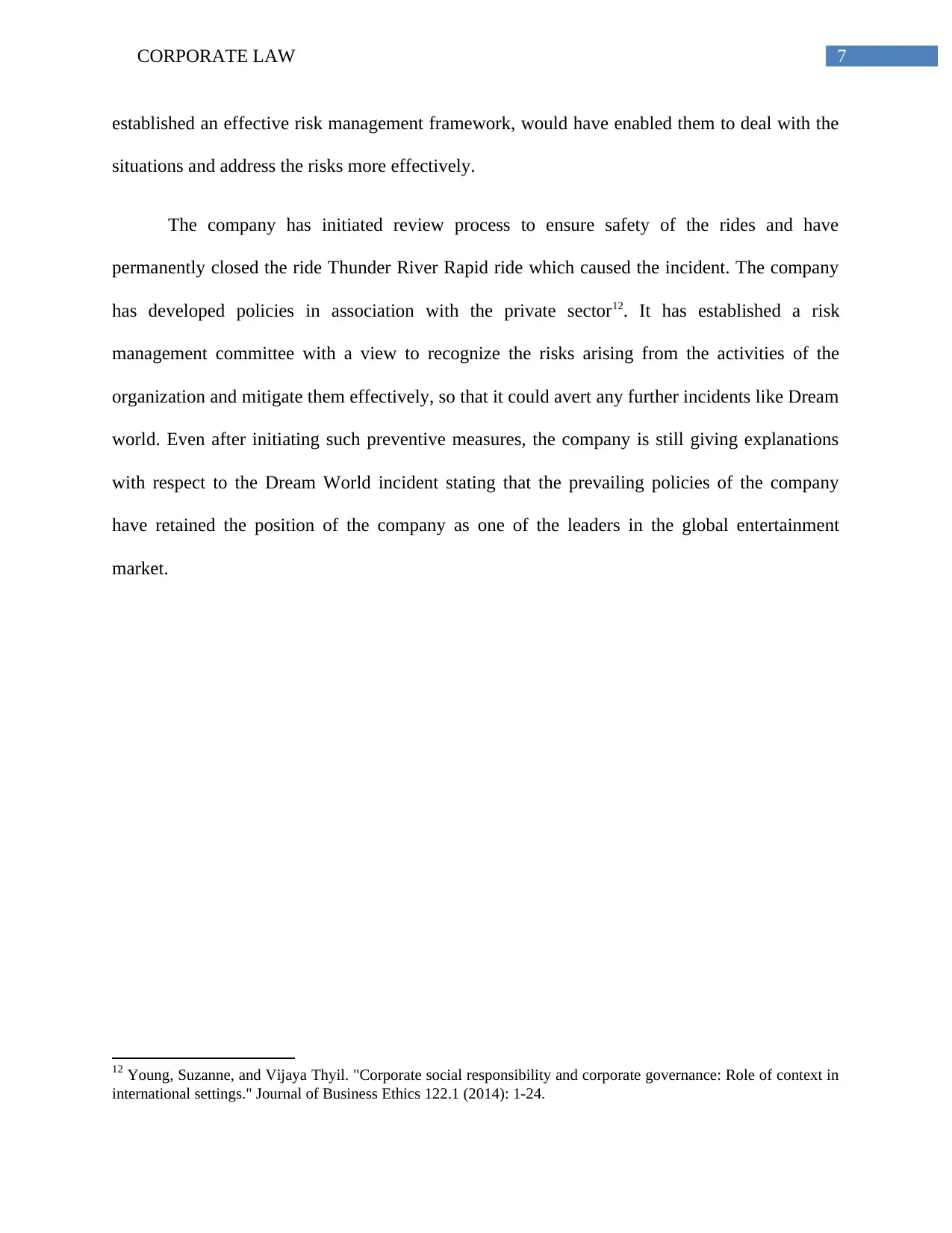
7CORPORATE LAW
established an effective risk management framework, would have enabled them to deal with the
situations and address the risks more effectively.
The company has initiated review process to ensure safety of the rides and have
permanently closed the ride Thunder River Rapid ride which caused the incident. The company
has developed policies in association with the private sector12. It has established a risk
management committee with a view to recognize the risks arising from the activities of the
organization and mitigate them effectively, so that it could avert any further incidents like Dream
world. Even after initiating such preventive measures, the company is still giving explanations
with respect to the Dream World incident stating that the prevailing policies of the company
have retained the position of the company as one of the leaders in the global entertainment
market.
12 Young, Suzanne, and Vijaya Thyil. "Corporate social responsibility and corporate governance: Role of context in
international settings." Journal of Business Ethics 122.1 (2014): 1-24.
established an effective risk management framework, would have enabled them to deal with the
situations and address the risks more effectively.
The company has initiated review process to ensure safety of the rides and have
permanently closed the ride Thunder River Rapid ride which caused the incident. The company
has developed policies in association with the private sector12. It has established a risk
management committee with a view to recognize the risks arising from the activities of the
organization and mitigate them effectively, so that it could avert any further incidents like Dream
world. Even after initiating such preventive measures, the company is still giving explanations
with respect to the Dream World incident stating that the prevailing policies of the company
have retained the position of the company as one of the leaders in the global entertainment
market.
12 Young, Suzanne, and Vijaya Thyil. "Corporate social responsibility and corporate governance: Role of context in
international settings." Journal of Business Ethics 122.1 (2014): 1-24.
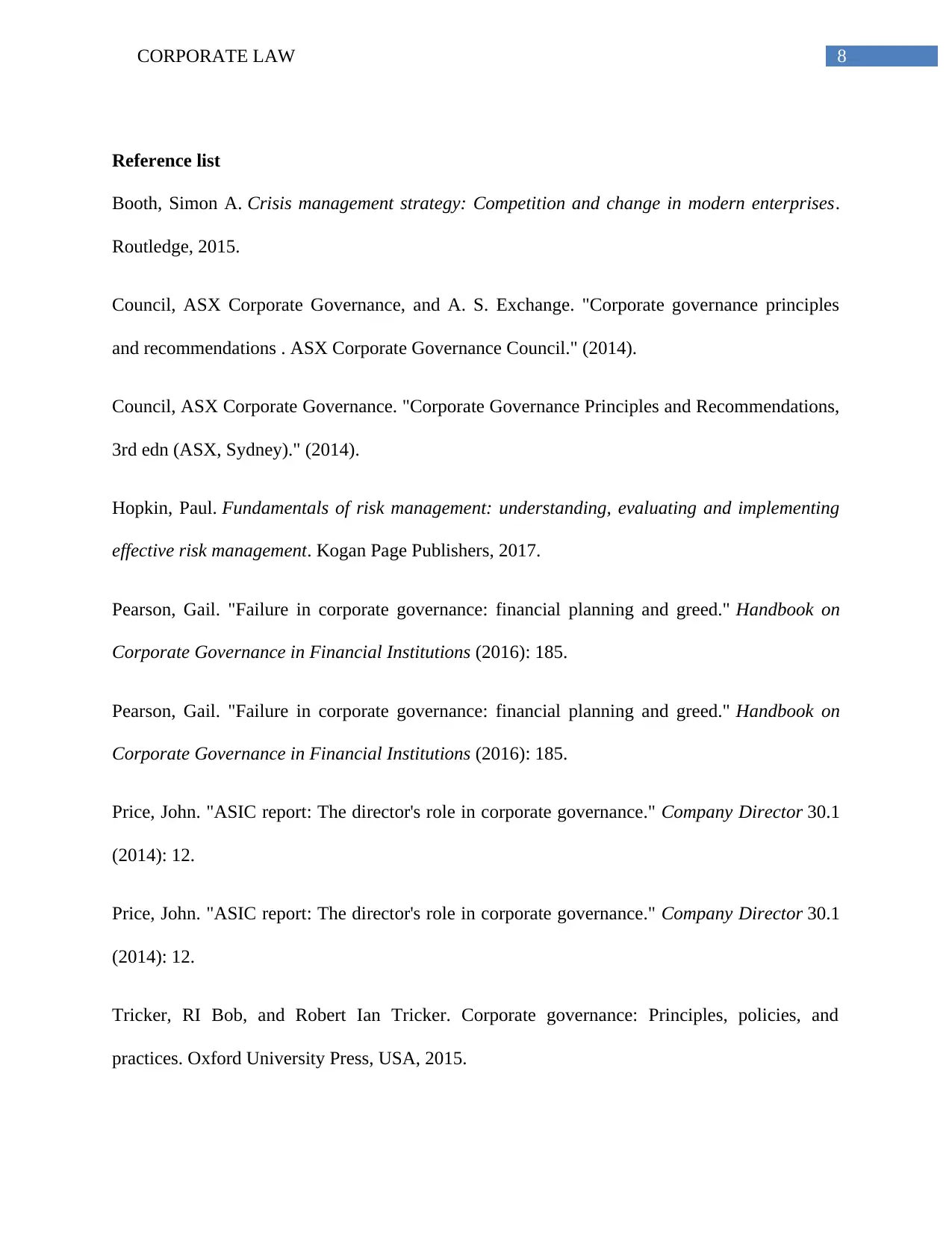
8CORPORATE LAW
Reference list
Booth, Simon A. Crisis management strategy: Competition and change in modern enterprises.
Routledge, 2015.
Council, ASX Corporate Governance, and A. S. Exchange. "Corporate governance principles
and recommendations . ASX Corporate Governance Council." (2014).
Council, ASX Corporate Governance. "Corporate Governance Principles and Recommendations,
3rd edn (ASX, Sydney)." (2014).
Hopkin, Paul. Fundamentals of risk management: understanding, evaluating and implementing
effective risk management. Kogan Page Publishers, 2017.
Pearson, Gail. "Failure in corporate governance: financial planning and greed." Handbook on
Corporate Governance in Financial Institutions (2016): 185.
Pearson, Gail. "Failure in corporate governance: financial planning and greed." Handbook on
Corporate Governance in Financial Institutions (2016): 185.
Price, John. "ASIC report: The director's role in corporate governance." Company Director 30.1
(2014): 12.
Price, John. "ASIC report: The director's role in corporate governance." Company Director 30.1
(2014): 12.
Tricker, RI Bob, and Robert Ian Tricker. Corporate governance: Principles, policies, and
practices. Oxford University Press, USA, 2015.
Reference list
Booth, Simon A. Crisis management strategy: Competition and change in modern enterprises.
Routledge, 2015.
Council, ASX Corporate Governance, and A. S. Exchange. "Corporate governance principles
and recommendations . ASX Corporate Governance Council." (2014).
Council, ASX Corporate Governance. "Corporate Governance Principles and Recommendations,
3rd edn (ASX, Sydney)." (2014).
Hopkin, Paul. Fundamentals of risk management: understanding, evaluating and implementing
effective risk management. Kogan Page Publishers, 2017.
Pearson, Gail. "Failure in corporate governance: financial planning and greed." Handbook on
Corporate Governance in Financial Institutions (2016): 185.
Pearson, Gail. "Failure in corporate governance: financial planning and greed." Handbook on
Corporate Governance in Financial Institutions (2016): 185.
Price, John. "ASIC report: The director's role in corporate governance." Company Director 30.1
(2014): 12.
Price, John. "ASIC report: The director's role in corporate governance." Company Director 30.1
(2014): 12.
Tricker, RI Bob, and Robert Ian Tricker. Corporate governance: Principles, policies, and
practices. Oxford University Press, USA, 2015.
⊘ This is a preview!⊘
Do you want full access?
Subscribe today to unlock all pages.

Trusted by 1+ million students worldwide
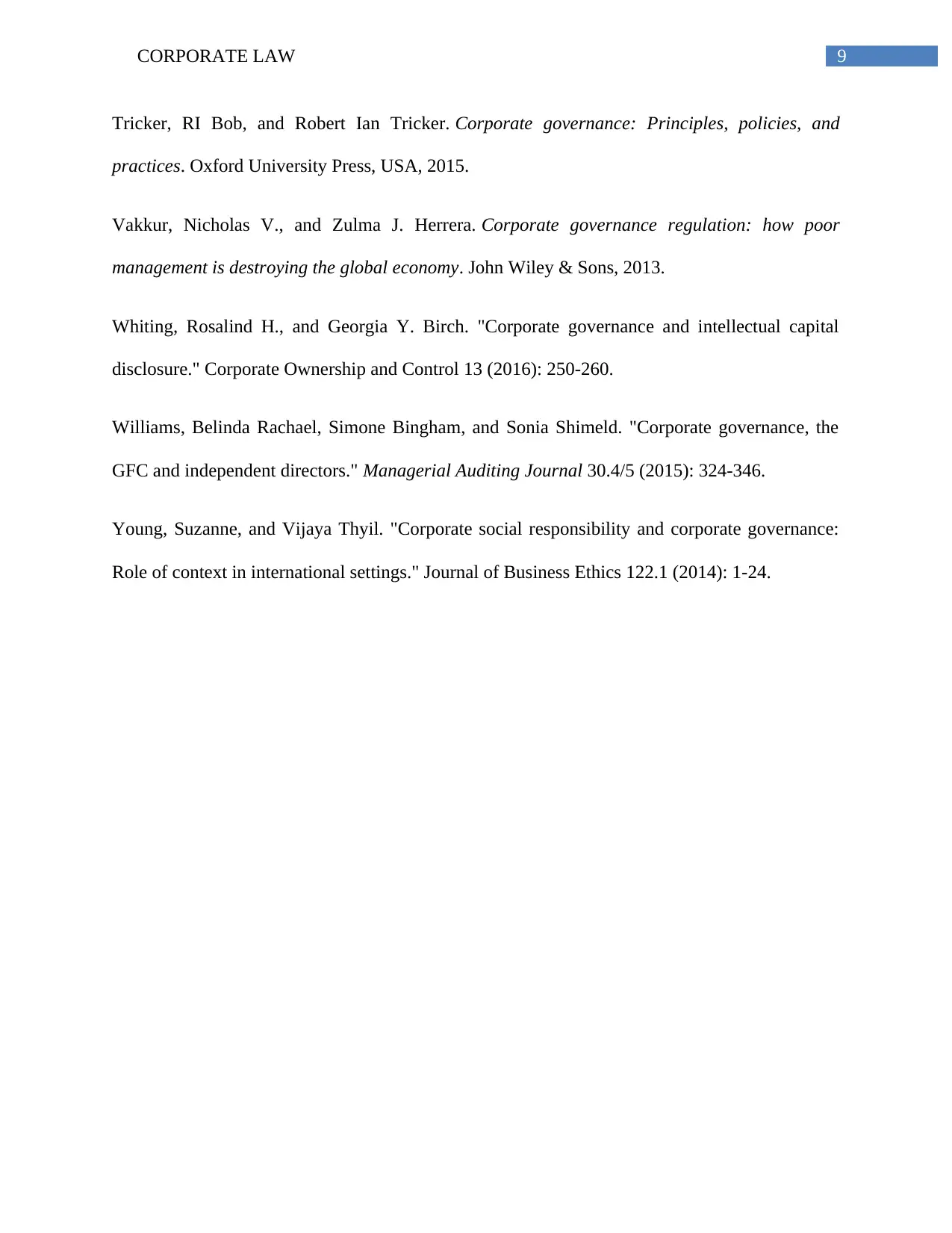
9CORPORATE LAW
Tricker, RI Bob, and Robert Ian Tricker. Corporate governance: Principles, policies, and
practices. Oxford University Press, USA, 2015.
Vakkur, Nicholas V., and Zulma J. Herrera. Corporate governance regulation: how poor
management is destroying the global economy. John Wiley & Sons, 2013.
Whiting, Rosalind H., and Georgia Y. Birch. "Corporate governance and intellectual capital
disclosure." Corporate Ownership and Control 13 (2016): 250-260.
Williams, Belinda Rachael, Simone Bingham, and Sonia Shimeld. "Corporate governance, the
GFC and independent directors." Managerial Auditing Journal 30.4/5 (2015): 324-346.
Young, Suzanne, and Vijaya Thyil. "Corporate social responsibility and corporate governance:
Role of context in international settings." Journal of Business Ethics 122.1 (2014): 1-24.
Tricker, RI Bob, and Robert Ian Tricker. Corporate governance: Principles, policies, and
practices. Oxford University Press, USA, 2015.
Vakkur, Nicholas V., and Zulma J. Herrera. Corporate governance regulation: how poor
management is destroying the global economy. John Wiley & Sons, 2013.
Whiting, Rosalind H., and Georgia Y. Birch. "Corporate governance and intellectual capital
disclosure." Corporate Ownership and Control 13 (2016): 250-260.
Williams, Belinda Rachael, Simone Bingham, and Sonia Shimeld. "Corporate governance, the
GFC and independent directors." Managerial Auditing Journal 30.4/5 (2015): 324-346.
Young, Suzanne, and Vijaya Thyil. "Corporate social responsibility and corporate governance:
Role of context in international settings." Journal of Business Ethics 122.1 (2014): 1-24.
1 out of 10
Related Documents
Your All-in-One AI-Powered Toolkit for Academic Success.
+13062052269
info@desklib.com
Available 24*7 on WhatsApp / Email
![[object Object]](/_next/static/media/star-bottom.7253800d.svg)
Unlock your academic potential
Copyright © 2020–2026 A2Z Services. All Rights Reserved. Developed and managed by ZUCOL.





